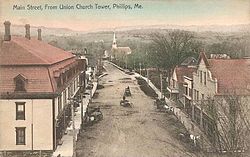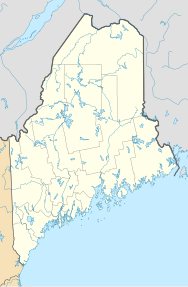Phillips, Maine
| Phillips, Maine | |
|---|---|
| Town | |

Main Street in 1907
|
|
| Location within the state of Maine | |
| Coordinates: 44°50′25″N 70°22′20″W / 44.84028°N 70.37222°W | |
| Country | United States |
| State | Maine |
| County | Franklin |
| Incorporated | 1812 |
| Area | |
| • Total | 50.99 sq mi (132.06 km2) |
| • Land | 50.81 sq mi (131.60 km2) |
| • Water | 0.18 sq mi (0.47 km2) |
| Elevation | 1,171 ft (357 m) |
| Population (2010) | |
| • Total | 1,028 |
| • Estimate (2012) | 1,028 |
| • Density | 20.2/sq mi (7.8/km2) |
| Time zone | Eastern (EST) (UTC-5) |
| • Summer (DST) | EDT (UTC-4) |
| ZIP code | 04966 |
| Area code(s) | 207 |
| FIPS code | 23-58445 |
| GNIS feature ID | 0582674 |
| Toothaker Pond | |
|---|---|
| Coordinates | 44°52′N 70°24′W / 44.867°N 70.400°W |
| Primary outflows | Sandy River |
| Max. length | 500 yd (460 m) |
| Surface area | 23 acres (9.3 ha) |
| Max. depth | 20 feet (6.1 m) |
| Water volume | 134 acre·ft (165,000 m3) |
| Surface elevation | 794 ft (242 m) |
Phillips is a town in Franklin County, Maine, United States. The population was 1,028 at the 2010 census. It is home to the Sandy River and Rangeley Lakes Railroad, a heritage railroad.
The plantation was part of a large tract granted by Massachusetts about 1790 to Jonathan Phillips of Boston. It was first settled in 1791 by Perkins Allen from Martha's Vineyard, a sea captain who called it Curvo. It was incorporated on February 25, 1812 and named for Phillips. The town was noted both for its productive soil, with hay the chief crop, and its superior water power. At falls along the Sandy River were erected sawmills, gristmills, a fulling mill and a carding machine.
Other industries included a starch factory, tannery, furniture factory, boot and shoe factory, carriage maker, and harness maker. Most significantly, however, Phillips became prosperous as the center for lumbering in the Rangeley Lake region. At first, lumber was shipped during winter months on sledges dragged across the snow by oxen. But then in 1879, the narrow-gauge Sandy River Railroad opened to Farmington, where the Maine Central Railroad carried freight to further destinations. In 1891, the line became the Sandy River and Rangeley Lakes Railroad. Although closed in 1935, it has been revived as a tourist attraction.
...
Wikipedia

